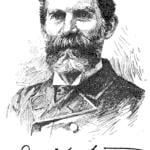Today people claim to be “spiritual but not religious.” Even many religious people seek to escape the material realm in favor of a more spiritual existence. But being “spiritual” is not always a good thing.
Catholic theologian Thomas Harmon has published a provocative article in The American Mind entitled The Spirit of the Clouds. Its topic is the “demonology of the internet,” which is interesting in itself. We’ll blog about that tomorrow. But in the course of that discussion, Harmon brings up why it’s wrong for human beings to try to be purely “spiritual,” and how Christianity has to do with “embodied life.”
He begins with a powerful quotation from the Catholic Christian novelist Walker Percy:
What she didn’t understand, she being spiritual and seeing religion as spirit, was that it took religion to save me from the spirit world, from orbiting the earth like Lucifer and the angels, that it took nothing less than touching the thread off the misty interstates and eating Christ himself to make me mortal again and let me inhabit my own flesh. –Walker Percy, Love in the Ruins
Let that sink in for awhile.
The Bible describes the Devil and our bondage to him like this (my bolds): “And you were dead in the trespasses and sins in which you once walked, following the course of this world, following the prince of the power of the air, the spirit that is now at work in the sons of disobedience” (Ephesians 2:1-2). Thus, Percy describes Lucifer and his angels as “orbiting the earth,” as do his lost characters, who are disconnected from actual, ordinary life, approaching everything and everyone as mere abstractions. (See also Percy’s non-fiction treatment of this theme, Lost in the Cosmos.)
The Lutheran J. G. Hamann also targets this problem, which is especially acute for modern-day rationalists, who reduce everything to mental propositions, and postmodern-day relativists, who reject objective reality altogether in favor of their mental “constructions.” And, Harmon shows, that spiritualizing mindset is encouraged even further by today’s information technology.
He quotes the pioneering media scholar Marshall McLuhan, whose analyses of the electronic media of his day–when those were primarily television and the telephone–are startlingly prophetic of what we have today. Though McLuhan was lauded by Sixties icons like Timothy Leary, he was a devout and conservative Catholic. I had always wondered about seeming paradox, but Harmon quotes from a collection of McLuhan’s writings about his faith and his scholarship entitled The Medium and the Light: Reflections on Religion: (my bolds):
Electric media, McLuhan points out, produces the very odd impression that one is a “‘super angel.’ When you are on the telephone you have no body. And, while your voice is there, you and the people you speak to are here, at the same time. Electric man has no bodily being. He is literally dis-carnate.” This impression of being discarnate, which electric media produces and social media especially exaggerates, might be thought at the very least partially to explain some of the most discarnate delusions of our time—transgenderism being the most obvious.
The democratization and further distribution of electronic media to anyone with a smart device seems to have exaggerated the effects of electric media. McLuhan already worried well before the advent of the internet as a popular tool, “I also think that this could be the time of the Antichrist. When electricity allows for the simultaneity of all information for every human being, it is Lucifer’s moment. He is the greatest electrical engineer.” Lucifer’s name, of course, means “light-bearer.”
Harmon, Percy, McLuhan, and Hamann all agree that the answer to this disembodied hyperspirituality, which can easily become demonic, is Christianity. Not the Gnostic heretical version of Christianity, which likewise rejects the physical world, but orthodox Christianity, with its emphasis on Creation, Incarnation, and the Sacraments. Harmon writes:
Embodied life, which is validated and sanctified by the Incarnation, is the antidote to demonic manipulation. The sacraments, which Christians have always understood to be a bodily extension of the incarnation, is the Christian version of the admonition to “touch grass.” Get in touch with embodied, material reality, which is proof against the discarnate abstraction of “the air,” in both the demonic and social media sense. Especially pertinent is the type of embodied community enabled by this kind of life, which is grounded in and makes us realize we are subject to things outside of our wills and imaginations.
Lutherans can certainly agree with this, while adding another way that Christianity and the Christian life affirm the “embodied life”: the doctrine of vocation.
Image by Gerd Altmann from Pixabay



















